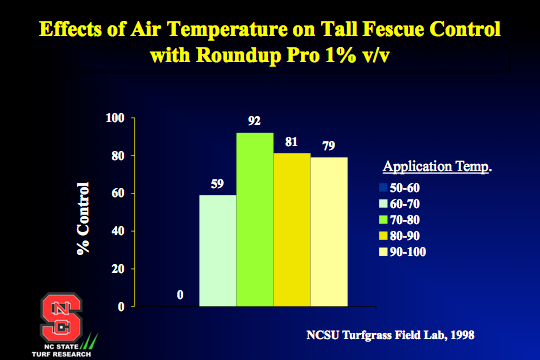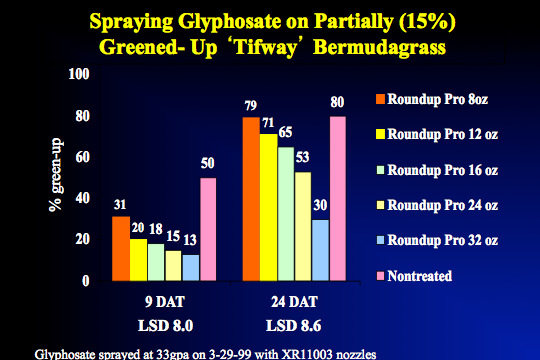Winter Glyphosate Applications to Bermudagrass
go.ncsu.edu/readext?650888
en Español / em Português
El inglés es el idioma de control de esta página. En la medida en que haya algún conflicto entre la traducción al inglés y la traducción, el inglés prevalece.
Al hacer clic en el enlace de traducción se activa un servicio de traducción gratuito para convertir la página al español. Al igual que con cualquier traducción por Internet, la conversión no es sensible al contexto y puede que no traduzca el texto en su significado original. NC State Extension no garantiza la exactitud del texto traducido. Por favor, tenga en cuenta que algunas aplicaciones y/o servicios pueden no funcionar como se espera cuando se traducen.
Português
Inglês é o idioma de controle desta página. Na medida que haja algum conflito entre o texto original em Inglês e a tradução, o Inglês prevalece.
Ao clicar no link de tradução, um serviço gratuito de tradução será ativado para converter a página para o Português. Como em qualquer tradução pela internet, a conversão não é sensivel ao contexto e pode não ocorrer a tradução para o significado orginal. O serviço de Extensão da Carolina do Norte (NC State Extension) não garante a exatidão do texto traduzido. Por favor, observe que algumas funções ou serviços podem não funcionar como esperado após a tradução.
English
English is the controlling language of this page. To the extent there is any conflict between the English text and the translation, English controls.
Clicking on the translation link activates a free translation service to convert the page to Spanish. As with any Internet translation, the conversion is not context-sensitive and may not translate the text to its original meaning. NC State Extension does not guarantee the accuracy of the translated text. Please note that some applications and/or services may not function as expected when translated.
Collapse ▲Glyphosate applications to dormant bermudagrass in winter are excellent for general weed control. Many weeds, including Poa annua, can be effectively controlled at the labeled rate of 0.5 lbs ai/a of glyphosate (1 pt/acre for the 4 lb/gallon product). Furthermore, glyphosate use is an important tool for resistance management of weeds in bermudagrass.
There are two common questions turfgrass managers frequently ask: 1) How important is ambient temperature for efficacy, and 2) Can damage to bermudagrass occur if bermudagrass is not totally dormant.
Importance of ambient temperature. The short answer is, temperature is the most important factor for good control. It is even more important than application rate of glyphosate. The general rule is to apply glyphosate on a day when temperatures exceed about 60 degrees. Figure 1 (top) shows the importance of air temperature on glyphosate activity. The test was done on tall fescue at an intentionally low rate in order to tease out the effects of air temperature. The target application temperatures ranged from 50-60 to 90-100. Note that when glyphosate was applied in the 50s, tall fescue control was 0. However, when applied in the 60s, control jumped to 59%. In the 70s, control increased to 92%. Therefore, my recommendation is to apply on a warm day. At least 60 degrees but 70 is even better.
What if bermudagrass is not completely dormant? The best scenario is a 70 degree day in winter when bermudagrass is totally dormant. If there is any green bermudagrass, glyphosate applications will likely result in a slight delay in greenup. However, as long as no more than 0.5 lbs ai/a is applied, my research has shown no permanent damage to bermudagrass. In fact, Figure 2 (bottom) shows the results of a trial on 15% greened up ‘Tifway’ bermudagrass. Note the 16 oz/acre rate at 9 days after treatment (9 DAT) reduced greenup from 50% in nontreated plots to 18%. However, by 24 days after treatment (DAT), the 16 oz/acre rate was 65% greened up compared to 80% for the nontreated. This delay, assuming broadcast sprayed, will likely not be noticeable. However, if spot spraying, then the delay in greenup will be much more noticeable. In summary, dormant bermudagrass is always recommended but slightly green bermudagrass will only be delayed if the 0.5 lbs ai/a rate is used




